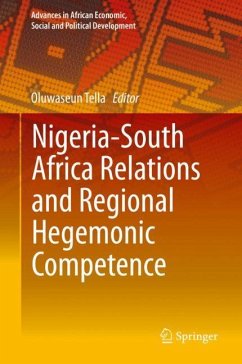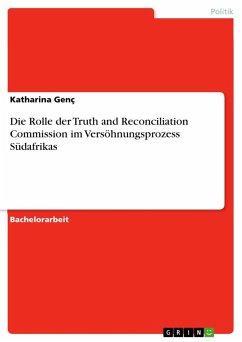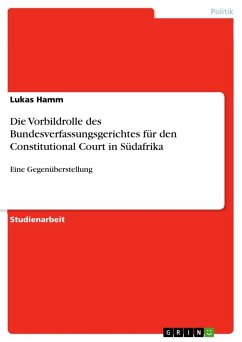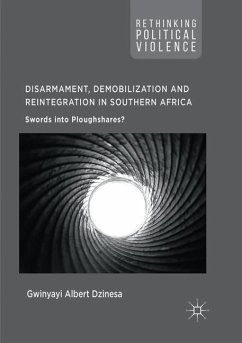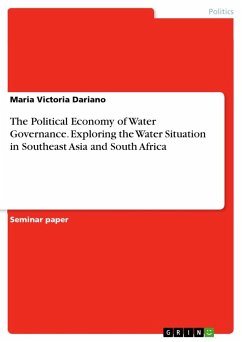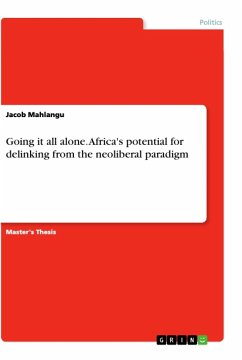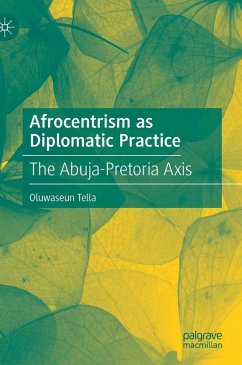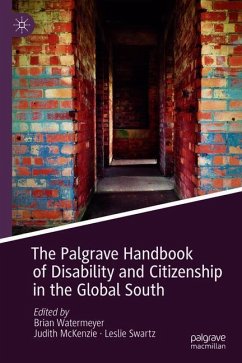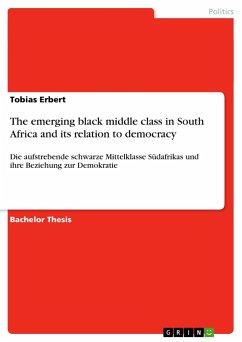
The emerging black middle class in South Africa and its relation to democracy
Die aufstrebende schwarze Mittelklasse Südafrikas und ihre Beziehung zur Demokratie

PAYBACK Punkte
0 °P sammeln!
Bachelor Thesis from the year 2013 in the subject Politics - International Politics - Region: Africa, grade: 1,3, Free University of Berlin, language: English, abstract: 19 years after the promising democratic change in South Africa, the countries challenges and disparities remain ubiquitous. The huge majority of black South Africans still lives in poverty, inequality has grown since the end of apartheid, service delivery is a permanent problem and democratic institutions are at least partly weak (Holden 2012: 95). However, the new South Africa is not only signified by the aggravation of dispa...
Bachelor Thesis from the year 2013 in the subject Politics - International Politics - Region: Africa, grade: 1,3, Free University of Berlin, language: English, abstract: 19 years after the promising democratic change in South Africa, the countries challenges and disparities remain ubiquitous. The huge majority of black South Africans still lives in poverty, inequality has grown since the end of apartheid, service delivery is a permanent problem and democratic institutions are at least partly weak (Holden 2012: 95). However, the new South Africa is not only signified by the aggravation of disparities. Over the last years, the emergence of a black middle class became steadily more tangible and is today a mostly undisputed phenomenon (Schrire 2005: 271; Southall 2004: 539; Everatt 2011: 79). Some research has been conducted especially to determine definition criteria and the size of a black middle class (Rivero et al. 2003; Southall 2004; Visagie, Posel 2011; Phadi, Ceruti 2011). The total middle class in South Africa included 29% black South Africans in 1994, while until 2011, their share had grown to 49.8% of the total middle class (Holden 2012: 226-227). In absolute numbers, the black middle class made up five million people in 2011 (Visagie, Posel 2011: 8, 17) while South Africa had a total black population of around 41 million people (Statistics SA 2011). Hence, approximately 8.2% of the black population group belongs to the black middle class. Although there is research discussing the size of the black middle class in South Africa, neither exists a comprehensive knowledge about the black middle class' attitudes towards democracy nor is there a profound analysis to which extent the black middle class may contribute to democracy (Everatt 2011: 79-80; Southall 2004: 528). In order to narrow these obvious research gaps, this study asks the following research questions: 1) How does the emerging black middle class in South Africa understand democracy? And 2) How can the relation between the emerging black middle class and democracy be assessed or rather does the emerging black middle class in South Africa contribute to the strengthening of democracy in the country? [...]




